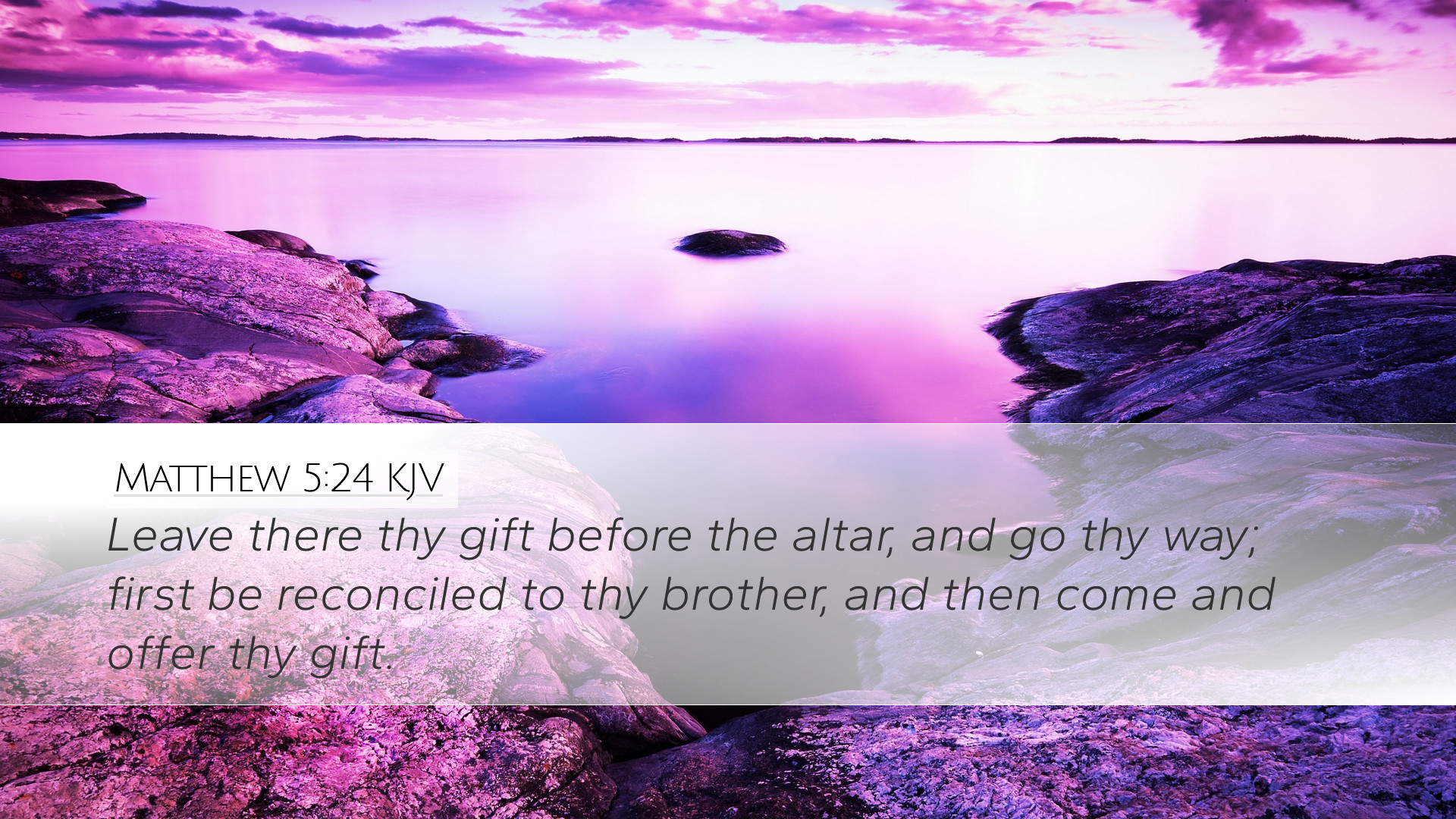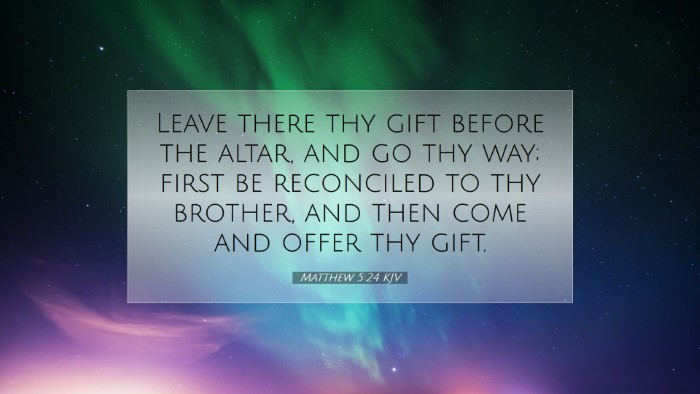Commentary on Matthew 5:24
Verse: "Leave your gift there before the altar and go. First be reconciled to your brother, and then come and offer your gift."
Introduction
The teachings of Jesus in the Sermon on the Mount, particularly in Matthew 5:24, emphasize the importance of reconciliation and interpersonal relationships in the life of faith. This commentary synthesizes insights from public domain works by Matthew Henry, Albert Barnes, and Adam Clarke, providing a comprehensive understanding of this crucial verse.
Contextual Overview
Matthew 5:24 is located within Jesus' broader discourse on true righteousness, particularly the call to surpass the superficial compliance to the Law. Here, Jesus addresses the significant issue of human relationships in the context of worship.
- Act of Worship: The act of leaving a gift at the altar signifies intention in worship and devotion.
- Importance of Relationships: Jesus emphasizes that reconciliation with others is paramount, suggesting that worship without this reconciliation is incomplete.
Insights from Matthew Henry
Matthew Henry highlights the overarching principle that God values mercy and justice over ritualistic offerings. He argues that:
- Reconciliation Priority: Relationships must be prioritized before ritualistic worship. The act of reconciliation is not merely an auxiliary but fundamental to genuine worship.
- God’s Expectation: God desires an all-encompassing obedience that includes loving one’s neighbor, thus echoing the sentiments found in other parts of scripture, such as the Great Commandment.
Insights from Albert Barnes
Albert Barnes expounds on the practical implications of this verse, emphasizing a theological framework that interlinks love for God and love for one’s neighbor. Key points from his commentary include:
- Nature of Gift: Barnes suggests that the act of offering reflects one’s relationship with God. An unresolved conflict undermines the sincerity of worship.
- Directive to Act: The command to “go” implies an active responsibility on the part of the believer to seek reconciliation proactively, positioning the believer’s duty as crucial prior to any form of worship.
Insights from Adam Clarke
Adam Clarke provides a nuanced understanding of the spiritual dimensions of this teaching. He emphasizes the following aspects:
- Spiritual State: Clarke posits that unresolved conflict affects the spiritual state of the worshiper, suggesting that purity of heart is a prerequisite for effective worship.
- Conditional Worship: The verse can be interpreted to mean that God’s acceptance of our worship is conditional upon the state of our relationships with others.
Theological Implications
This passage challenges believers to examine their hearts and relationships in light of their worship practices. The implications are profound for various areas:
- Worship and Community: It reinforces the idea that corporate worship is deeply tied to the health of the community.
- Forgiveness as a Duty: Illustrates that seeking forgiveness and reconciliation is a crucial part of the Christian life, reflecting God’s character of grace.
- Ethical Living: Enjoins ethical living as a central aspect of Christian witness, where the horizontal relationship (with others) is as vital as the vertical relationship (with God).
Practical Applications for Pastors and Theologians
Reflection on Matthew 5:24 suggests numerous applications for pastoral ministry and theological reflection:
- Preaching and Teaching: Integrate reconciliation themes into sermons, underscoring their relevance to both personal and corporate worship.
- Conflict Resolution: Encourage church leadership to develop practices that promote reconciliation among members, thereby fostering community health.
- Spiritual Formation: Incorporate teachings on reconciliation into programs for spiritual growth, recognizing it as a critical aspect of discipleship.
Conclusion
Matthew 5:24 serves as a profound reminder of the interconnectedness of our relationships with others and our relationship with God. When believers bring disputes and conflicts before God, they embody the heart of Christ, promoting a community reflective of Jesus’ love and grace. Understanding and practicing the teachings within this verse will not only enrich individual faith but will also transform church culture.


